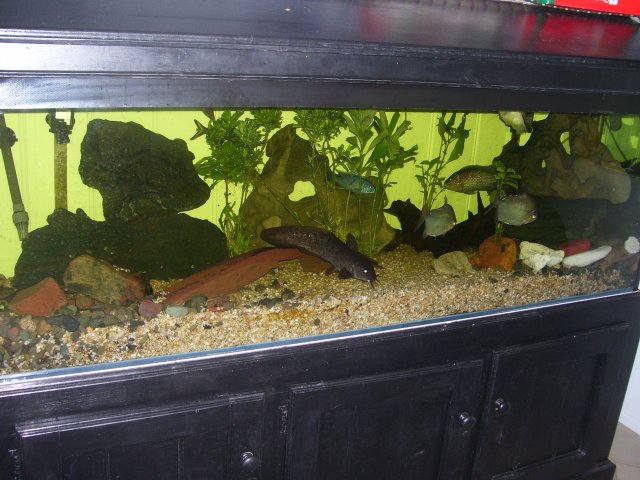I think there is a lot more to stunting than just one or two big items. Fish health and the ability to reach full genetic potential depends on a multitude of factors including the genetics, a healthy near-environment (basically water quality for fish), an appropriate environment (this includes decor, swimming space, refuge, current, lighting), and suitable food in sufficient quantity but not in excess.
You need to know how big the fish should be (Fishbase is a reliable source for this), what sort of water and physical environment the fish lives in and what its lifestyle is a schooler, lurking predator, active hunter predator, whatever, whether or not it allows or even may need conspecific or perhaps dither tankmates, or none at all. Any of these can and likely will change during development for any given fish.
Tank size hits several of these points as it allows for areas of current, for visually complex setups to explore, and space for swimming. Plus, it plays on my signature line of the answer to pollution is dilution. With increased water volume, pollutants of whatever type will be at lower concentration than the same bioload will give in smaller quarters.
Many or most fish seem to like areas of current, many do play or exercise in the current. Hunters get some just by exploration of a complex environment. Schoolers absolutely must have it or they will show caged animal stereotyped behavior just to work off activity normal and in effect hard-wired into the animal. Fish need exercise. All mobile animals need exercise. Koi kept in shallow ponds do not develop normal configurations. They are too long and slender. They need depth as well as length and width. Without exercise, muscle mass will not be in normal proportion to frame and internal organs. Puffers have less structured skeletons than most fish (adaptation to puffing), so IMHO they need to have whatever exercise they are willing to do to allow normal physical development. The space or volume bit has impact here as well. Pollution, whether from metabolites or hormones of general organics, suppresses normal growth and development. What levels of which are important? We do not know. We do that it varies from family to family for various pollutants over a substantial range. It is highly likely to vary from species to species within a family. In the best of all possible worlds, tanks would all be a high multiple of the length of the fish housed there. In reality, we rarely can provide that other than for the smallest fish. But we try to just as much volume as we can. We provide both current and relative calm, without having totally dead areas, in the tank, and we match the decor to the lifestyle of the fish.
Naturally, we feed both well and wisely. We meet the fish's nutritional and for the special needs of certain speciesand physical food suited to the particular fish. We provide enough to allow the fish to grow normally, but not so much that the fish is obese. Obesity is as great an issue for fish as for people and dogs. Too much food, not the best food, and feeding too often, all lead to problems.
Water quality I'll assume as a given. Un-oxidized metabolites (ammonia and/or nitrite) are never detectable, oxidized metabolites (nitrate) are as low as is practical for us to provide, but certainly below 40 ppm nitrate, better below 20 ppm, best at or below 10 ppm. Organics are kept low by large water changes at sufficiently short intervals that hobby testable water parameters are never far off from the source water used for the tank (whether tap or processed or otherwise modified). That means the water you remove should be quite close to the water you will replace it with, excepting perhaps the nitrate titer, and the organic (which we cannot measure).
IF you can provide all of this, your fish will, on the average, exceed the normal lifespan of the species in the wild, and frequently will be as large as if not larger than the wild counterparts. Anything less is stunting. Anything less will result in lower health and shorter life.
To me stunting is insufficient space, improper diet and exercise, and both chemical and physical environmental deficiencies. Any or all of those lacks can contribute. Any or all can result in a stunted fish.



